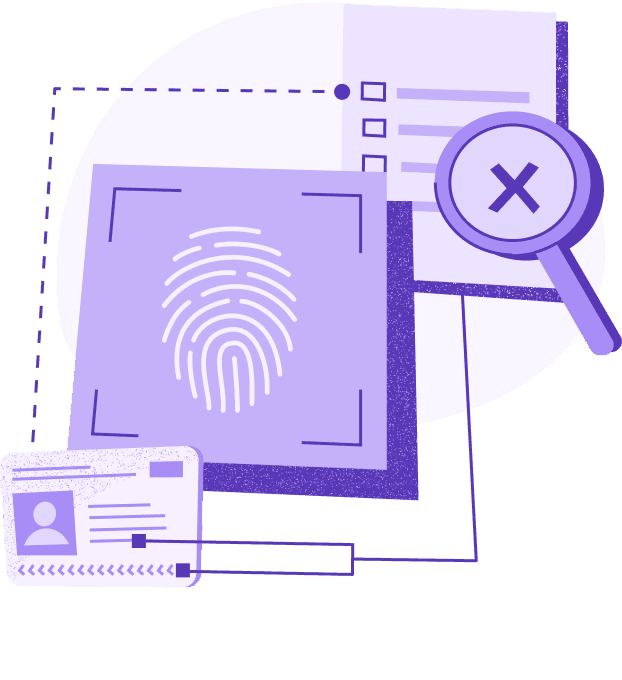Article
3 min read
A Guide to Employee Background Checks in Pakistan
Employee background checks
Legal & compliance

Author
Michał Kowalewski
Last Update
January 31, 2025

Table of Contents
Essential information for a background check in Pakistan
Are background checks legal in Pakistan?
What types of background checks are illegal in Pakistan?
Types of background checks in Pakistan
When should you run employee background checks in Pakistan
Background check mistakes to avoid in Pakistan
Step-by-step guide to employee background checks in Pakistan
Key takeaways
- Well-executed background checks ensure a detailed verification of employment history, education, criminal records, and other relevant checks for informed hiring.
- Employee background checks are legal in Pakistan, however, you have to obtain the candidate's consent and align with Pakistan's data protection laws.
- Common mistakes in running background checks include insufficient consent, bias, inadequate data protection, incomplete checks, and over-collection of information.
Employee background checks should be an integral part of your recruitment process when looking to hire in Pakistan. Although not mandatory, they are a common practice, especially in finance and healthcare industries.
Why is it so important? Screening your job applicants not only helps confirm the competencies of your new hire but also ensures a safe and reliable working environment.
In a country where the job market is so big (working-age population is set at 85.78 million) and rapidly growing, understanding how to run effective background checks will help you sift through the vast pool of candidates and find the best ones for the job.
In this article, you will discover:
- What types of background checks are legal in Pakistan
- Steps to run an effective employee background check
- What mistakes to avoid when performing a background check in Pakistan
Essential information for a background check in Pakistan
An employee background check is the process of verifying a potential hire’s work history, education, professional qualifications, and any criminal records they might have. It’s particularly beneficial to run before finalizing an employment offer or signing a contract, as it ensures that the candidate meets the organization's standards and requirements.
In Pakistan, the legal framework governing background checks for employment is primarily shaped by the Data Protection Laws and the Pakistan Telecommunication (Re-organization) Act, 1996. The National Database and Registration Authority (NADRA) and the Pakistan Telecommunication Authority (PTA) are key organizations involved in maintaining and regulating personal data and telecommunication records, respectively.
The duration of a background check process can vary based on the complexity of the verification required. Typically, it can take anywhere from a few days to a few weeks to complete the process. However, if you’re looking for a fast background check, Deel can handle the process in a matter of minutes.
Are background checks legal in Pakistan?
Yes, background checks are legal in Pakistan. Pakistani law does not specifically forbid conducting background checks on job candidates, whether these checks are carried out directly by the employer or through an external agency. However, according to the Prevention of Electronic Crimes Act (PECA) employers are required to obtain the candidate's consent before conducting a background check.
Additionally, companies running background checks should adhere to the data protection laws and avoid infringing on the candidate’s right to privacy. All information gathered must be used only for the purpose for which it was collected and should not be disclosed to unauthorized parties.
It’s also worth noting that candidates have the right to refuse to undergo pre pre-employment background check in Pakistan. However, their refusal may impact their eligibility for certain job positions, especially those that require thorough security and trustworthiness assessments.
Continuous Compliance™
What types of background checks are illegal in Pakistan?
While Pakistani regulations do not explicitly forbid employee background checks, there are certain prohibited practices that could result in legal repercussions for the employer, such as fines, potential lawsuits, and reputation damage.
- Credit checks without the candidate's consent and obtaining information through unauthorized means are considered illegal.
- Employers should refrain from requesting information that is not directly relevant to the candidate's job responsibilities and respect the data privacy laws.
Types of background checks in Pakistan
In Pakistan, the scope of employment screening includes a few critical areas that will help you assess a candidate's competencies. Understanding these types can help employers tailor their screening processes to meet specific job requirements and legal standards.
| Type of Check | Common in Pakistan | Reason |
|---|---|---|
| Employment Verification | Common | Ensures accuracy of the candidate's work history and performance. |
| Criminal Record Check | Common | Crucial for assessing the candidate's legal history and ensuring workplace safety. |
| Credit History Check | Less common | Less common due to privacy concerns and limited access to credit history information. |
| Social Media Screening | Common | Increasingly common to gauge the candidate's professional conduct and online presence. |
| Professional License Check | Common | Essential in regulated industries to verify the candidate's eligibility to practice professionally. |
| Drug Testing | Less common | Industries like transportation, healthcare, law enforcement, may conduct drug tests as a part of their pre-employment screening process. |
When should you run employee background checks in Pakistan
Timing of employee background checks can play a big part in securing top talent. Ideally, these checks should occur after a conditional job offer has been extended to the candidate but before their official employment begins.
This approach ensures that all potential employees are assessed fairly and consistently, safeguarding against any inadvertent discrimination.
Additionally, certain positions, especially those involving financial responsibilities, access to sensitive information, or direct interaction with vulnerable populations, may necessitate more rigorous and immediate background investigations.
Background check mistakes to avoid in Pakistan
Doesn’t matter if you’re hiring employees or contractors in Pakistan, there are a few things that you shouldn’t do as an employer, when it comes to background checks. Here they are:
- Inadequate consent: Failing to obtain explicit consent from the candidate before conducting a background check can result in legal repercussions.
- Biased screening: Allowing personal biases to influence the employment screening process can result in discriminatory hiring practices.
- Lack of data protection: Inadequate measures to protect the candidate's personal information can violate data protection laws.
- Incomplete verification: Relying solely on the candidate's self-disclosed information without thorough verification can lead to hiring inaccuracies.
- Gathering too much information: Obtaining too much data on your potential employee can lead to breaches of privacy and potentially infringe upon their rights, risking non-compliance with privacy regulations and ethical concerns.
Step-by-step guide to employee background checks in Pakistan
Below is a list of steps that employers in Pakistan should follow to ensure a legal and effective background checks:
- Obtain candidate consent: Before initiating a background check, obtain written consent from the candidate. This consent form typically includes sections for the candidate's full name (including any maiden names or aliases), current address, date of birth, and Social Security number.
- Verify identity: Use the candidate's ID card or passport to verify their identity through NADRA.
- Verify employment history: Contact previous employers to verify the candidate's work experience and performance.
- Verify educational qualifications: Validate the candidate's educational credentials from the respective educational institutions.
- Check criminal record: Conduct a criminal record check through the local police station or NADRA.
- Check references: Speak with the candidate's provided references to gain insights into their professional conduct and work ethic.
- Check financial history: Verify the candidate's financial history within the legal boundaries, ensuring consent and relevance to the job role.
- Social media screening: Reviewing a candidate’s social media professionally involves analyzing their online interactions and presence on platforms like Linkedin and Facebook, to gauge their personality and professional image. This evaluation should be conducted with respect to privacy and relevance to the job and cultural fit.
- Regulatory compliance: Ensure compliance with data protection laws and regulations throughout the background check process.
- Document and report: Maintain thorough documentation of the background check process and compile a comprehensive report for review.
Alternatively, you can automate this process using Deel and get a fast employee background check, with results coming in a matter of minutes.
Doing background checks with Deel has always been good to us! The process is very straightforward. I can easily send a request and receive the results right away. Fast and convenient service!
—Cynthia Le ,
Program manager
Background checks

About the author
Michał Kowalewski a writer and content manager with 7+ years of experience in digital marketing. He spent most of his professional career working in startups and tech industry. He's a big proponent of remote work considering it not just a professional preference but a lifestyle that enhances productivity and fosters a flexible work environment. He enjoys tackling topics of venture capital, equity, and startup finance.
















